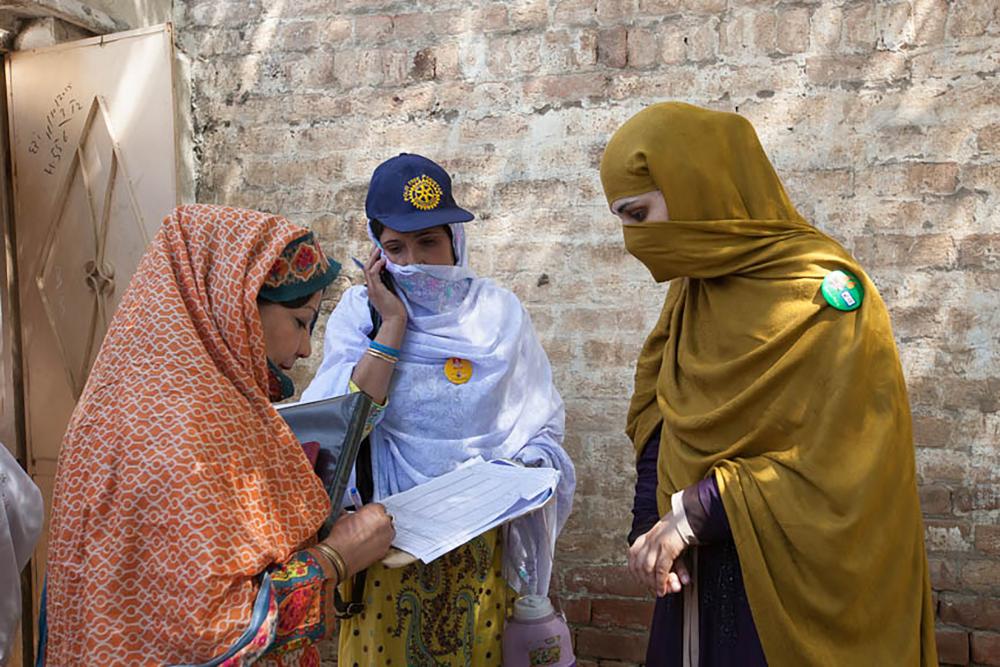
Pakistan health workers are replacing traditional paper-reporting with accurate and timely cellphone-based reporting.
By Ryan Hyland Photo by Khaula Jamil
Mobile phones and simple text messaging may be the keys to victory in the world’s largest public health initiative: the eradication of polio.
As the disease retreats from the global stage, thriving in only a few remote areas in three countries, it’s up to health workers to deliver vaccines and share information with speed and accuracy.
Health workers in Pakistan are receiving cellphone and e-monitoring training at the Rotary Resource Center in Nowshera, Khyber Pakhtunkhwa.
Rotary and its partners in the Global Polio Eradication Initiative are strengthening the lines of communication by giving cellphones to health workers in Pakistan and Nigeria, where a single text message could save a life.
In Pakistan, Rotary has been working to replace traditional paper-based reporting of maternal and child health information, including polio immunization data, with mobile phone and e-monitoring technology.
Community health workers across the nation have received more than 800 phones through a partnership with Rotary, the Pakistani government; Telenor, the country’s second-largest telecommunications provider; and Eycon, a data monitoring and evaluation specialist. Organizers plan to distribute a total of 5,000 cellphones by the end of 2018.
Health workers can use the phones to send data via text message to a central server. If they see a potential polio case, they can immediately alert officials at Pakistan’s National Emergency Operations Center. They also can note any children who didn’t receive the vaccine or parental refusals – and record successful immunizations. In Pakistan, the polio eradication effort aims to reach the nation’s 35 million children under age five.
The result is a collection of real-time information that officials can easily monitor and assess, says Michel Thieren, regional emergency director of the World Health Organization’s Health Emergency Program.
Pakistan health workers are replacing traditional paper-reporting with accurate and timely cellphone-based reporting.
“Cellphone technology signals tremendous progress in the polio eradication program,” says Thieren, who has directed polio-related initiatives for WHO in Pakistan. “The data we collect needs to have such a granular level of detail. With real-time information that can be recorded and transcribed immediately, you can increase accuracy and validity.
“This gives governments and polio eradication leaders an advantage in the decisions we need to make operationally and tactically to eliminate polio,” Thieren says.
Beyond polio
Health workers also are using mobile phones to monitor a multitude of maternal and child health factors.
Pakistan’s child mortality rate ranks among the highest in the world, according to UNICEF, with 81 deaths under age five per 1,000 live births.
But mobile technology can help reduce those deaths, says Asher Ali, project manager for Rotary’s Pakistan PolioPlus Committee.
“Our health workers, including community midwives, are tracking pregnant mothers,” Ali says. “When a child is born, they can input and maintain complete health records, not just for polio, but for other vaccines and basic health care and hygiene needs.”
They also can monitor infectious diseases, such as malaria, tuberculosis, and influenza-like illnesses, as well as child malnutrition and maternal health concerns.
“If there is a problem with the baby or the mother, we can send information to the government health departments immediately, so they can solve the issue quickly and adjust their strategies,” Ali says.
Cellphones also facilitate follow-up visits with families, because health workers can send appointment reminders over text message.